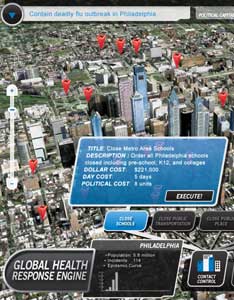USC tries video games as teaching tool
September - October, 2009 | Volume 8, Issue 5
The University of Southern California is taking advantage of its digitally savvy students on a campus where creativity is a natural part of the curriculum and electronic games have become learning devices.

Photo courtesy of USC Global
Health Response Engine
Philadelphia is under attack from an infectious
disease outbreak in this simulation used by
global health students at the University of
Southern California. Games rooted in science are
excellent teaching tools for today’s students,
says the program’s Dr. Heather Wipfli.
"We are using gaming to develop virtual simulations that are engaging and rooted in science and can be used as a teaching tool for global health students, says Dr. Heather Wipfli.
Games like "Immune Attack" or "Darfur is Dying" use real data and can be tailored to specific health problems for use by students in coming up with new solutions.
Wipfli says the USC "Global Response Health Engine" program provides an example of what five university presidents advised during the CUGH meeting—using an institution's unique strengths to build global health curricula.
At USC, where gaming is already part of other courses, the medical school where Wipfli teaches collaborates with schools of cinema, engineering, communications, business, fine arts, music, arts and sciences and with the Los Angeles gaming industry itself.
"It's less about facts and figures and more about teaching students how to access information and how to judge whether it is credible information or not," she says. "We want to make it very clear, gaming is serious business. We are not just playing around here."
To view Adobe PDF files,
download current, free accessible plug-ins from Adobe's website.